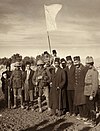Wikipedia:Selected anniversaries/December 9
This is a list of selected December 9 anniversaries that appear in the "On this day" section of the Main Page. To suggest a new item, in most cases, you can be bold and edit this page. Please read the selected anniversaries guidelines before making your edit. However, if your addition might be controversial or on a day that is or will soon be on the Main Page, please post your suggestion on the talk page instead.
Please note that the events listed on the Main Page are chosen based more on relative article quality and to maintain a mix of topics, not based solely on how important or significant their subjects are. Only four to five events are posted at a time and thus not everything that is "most important and significant" can be listed. In addition, an event is generally not posted this year if it is also the subject of the scheduled featured article or picture of the day.
To report an error when this appears on the Main Page, see Main Page errors. Please remember that this list defers to the supporting articles, so it is best to achieve consensus and make any necessary changes there first.
Images
Use only ONE image at a time
-
Marguerite Durand
-
Electron microscope picture of smallpox
-
First computer mouse
-
Arenberg Castle, on the campus of the Catholic University of Leuven
-
General Antonio José de Sucre
-
Cruiser Mk I tank
Ineligible
| Blurb | Reason |
|---|---|
| Fête de l'Escalade in Switzerland | refimprove, linkrot |
| ; Army Day in Peru (1824) | refimprove |
| Independence Day in Tanzania (1961) | unreferenced sections |
| 1425 – Pope Martin V issued a papal bull establishing what later became the Catholic University of Leuven, the largest, oldest and most prominent university in Belgium. | unreferenced section |
| 1824 – Forces led by General Antonio José de Sucre defeated a Royalist army in the Battle of Ayacucho, ending the Peruvian War of Independence. | refimprove section, unreferenced section |
| 1856 – Anglo-Persian War: Bushire, a city on the southwestern coast of the Persian Gulf in present-day Iran, surrendered to occupying British forces. | Tagged with {{refimprove}} |
| 1897 – Stage actress, journalist and leading suffragette Marguerite Durand founded the feminist newspaper La Fronde. | Durand: refimprove; Fronde: lots of {{cn}} tags |
| 1922 – Gabriel Narutowicz was elected as the first President of Poland by the Polish parliament. | refimprove |
| 1946 – The Doctors' trial, the first of the Subsequent Nuremberg Trials, began to prosecute doctors who were allegedly involved in Nazi human experimentation during World War II. | needs more footnotes |
| 1960 – Coronation Street, the longest-running television soap opera in the United Kingdom, was first broadcast on ITV. | unreferenced section |
| 1961 – Tanganyika gained independence from Britain before becoming part of Tanzania three years later. | stubby |
| 1990 – Lech Wałęsa became the first person elected President of Poland in a direct presidential election after the collapse of communism across Eastern Europe. | appears on August 14 |
Eligible
- 1775 – American Revolutionary War: After their loss in the Battle of Great Bridge, British authorities were forced to evacuate from the Colony of Virginia.
- 1911 – A mine explosion near Briceville, Tennessee, killed 84 miners despite a well-organized rescue effort led by the United States Bureau of Mines.
- 1931 – The approval of the Spanish Constitution by the Constituent Cortes paved the way to the establishment of the Second Spanish Republic.
- 1940 – Second World War: British and Commonwealth forces opened Operation Compass, the first major Allied military operation of the Western Desert Campaign.
- 1958 – The John Birch Society, named after John Birch, an American missionary who was killed in China by communists, was founded to fight the perceived threat of communism in the United States.
- 1965 – A large, brilliant fireball was seen by thousands in midwestern North America before crash landing in Kecksburg, Pennsylvania.
- 1965 – A Charlie Brown Christmas, the first television adaptation of Charles Schulz's comic strip Peanuts, was broadcast for the first time.
- 1969 – U.S. Secretary of State William P. Rogers proposed his plan for a ceasefire in the War of Attrition; Egypt's and Jordan's acceptance of it over PLO objections led to civil war in Jordan in September 1970.
- 1979 – A World Health Organization commission of scientists certified the global eradication of smallpox, making it the only human infectious disease to date to have been completely eradicated from nature.
- 1981 – Mumia Abu-Jamal was arrested for the murder of Philadelphia police officer Daniel Faulkner; his subsequent conviction and death sentence became the source of great controversy in the United States.
- 2008 – Governor of Illinois Rod Blagojevich was arrested for a number of corruption crimes, including attempting to sell the U.S. Senate seat that was being vacated by then-US President-elect Barack Obama.
December 9: 100th birthday of actor Kirk Douglas
- 1872 – P. B. S. Pinchback took office as Governor of Louisiana, the first African American governor of a U.S. state.
- 1905 – Legislation establishing state secularism in France was passed by the Chamber of Deputies of France, triggering civil disobedience by French Catholics.
- 1917 – First World War: Hussein al-Husayni, the Ottoman mayor of Jerusalem, surrendered (pictured) the city to the British.
- 1948 – The United Nations General Assembly adopted the Genocide Convention, which defines genocide in legal terms and advises its signatories to prevent and punish such actions.
- 1968 – Douglas Engelbart gave what became known as "The Mother of All Demos", publicly debuting the computer mouse, hypertext, and the bit-mapped graphical user interface using the oN-Line System (NLS).







